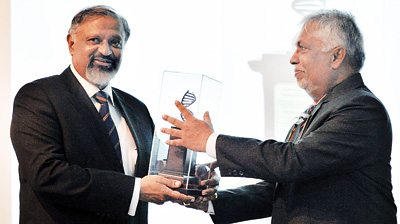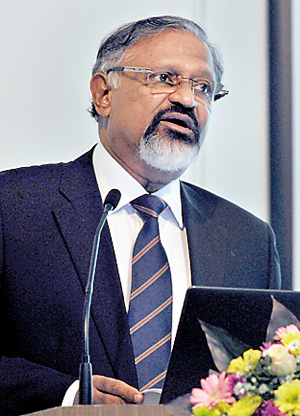Sunday Times 2
Remembering a prof’s service to medicine
View(s):It was an emotionally-charged ‘Valedictory meeting’ when high-level academics, both medical and non-medical, gathered at the New Lecture Hall of the august Colombo Medical Faculty on September 17 to bid adieu to former dean, mentor, colleague and friend, Prof. Rohan W. Jayasekara.

Prof. Rohan Jayasekara is presented with a 'genetic' token depicting DNA strands by Colombo University Vice Chancellor Prof. Lakshman Dissanayake
While brief and powerful presentations were made to showcase how Prof. Jayasekara’s ‘innovative and trailblazing baby’ has matured to provide an invaluable service to Sri Lankans scattered across the country, there were the others who spoke of the humble and helpful persona that he was all the time.
‘Human genetics’ was Prof. Jayasekara’s very own baby when Sri Lanka had not even imagined about its potential as the new frontier of medicine. He retired after more than four decades of service. “The legacy that Rohan leaves behind is his pioneering contribution to the development of the specialty of Medical Genetics in Sri Lanka. In 1983, upon his return from training in the United Kingdom, he founded the Human Genetics Unit which was one of the first units of its kind in the Asian region,” said Colombo University Vice Chancellor Prof. Lakshman Dissanayake.
Pointing out that thereafter for over one and a half decades Rohan single handedly promoted the specialty in the country, travelling to all corners of the island, he said that today the Human Genetics Unit has grown to be known as a centre of excellence on par with any in the developed world.

The distinguished gathering at the 'Valedictory academic meeting'. In the front row (from right) are Prof. Vajira H.W. Dissanayake, Mrs. Varuni Jayasekara and Prof. Rohan Jayasekara.
Prof. Dissanayake commended him as “a renowned academic, researcher, clinician and administrator par excellence”, with his forthright and no-nonsense approach whenever various complicated issues were deliberated. He also paid a tribute to him for grooming and mentoring the next generation in his department, thus ensuring continuity of the good work he had started.
Adding her voice to the accolades, the Dean of the Colombo Medical Faculty, Prof. Jennifer Perera reiterated that Prof. Jayasekara’s “most outstanding” contribution to medicine has been in the field of human genetics which revolutionized the outlook on medical genetics in Sri Lanka.
“He worked with dedication and commitment to ensure that medical genetics takes centre-stage in the prevention and management of genetically-inherited disorders. He was also instrumental in establishing the much-sought after Genetic Counselling Service at the Medical Faculty,” she added.
Referring to his teaching abilities, Prof. Perera pointed out that Prof. Jayasekara made the complicated science of genetics very fascinating and simple to learners. He also made sure that the subject of Anatomy which is fundamental to understanding the mechanics of the human body was taught with adequate depth as application of this subject is vital to accurate diagnosis and management of patients.

An emotional address by Prof. Rohan W. Jayasekara (Pix by Amila Gamage)
In spite of the numerous advances in medical education, he strongly endorsed the need for the continuation of cadaveric dissections in the teaching and learning of Anatomy and ensured the sustainability of such facilities at the faculty, she said, adding that he also excelled as an administrator.
It was Prof. Vajira H.W. Dissanayake, who has followed closely in the footsteps of Prof. Jayasekara, who traced his guru’s life from birth to retirement and also went into detail about his major contributions.
Titling his talk ‘The pioneer medical geneticist’, the current Director of the Human Genetics Unit and Professor in Anatomy, Prof. Dissanayake brought about laughter when he spoke of “naughty” Rohan who was admitted to St. Peter’s College, one year ahead of time because it was not easy to keep him at home!
Excelling in his studies and qualifying to pursue medicine at the Peradeniya campus of the University of Ceylon at the tender age of 17, Rohan had declared that otherwise he would have been a pilot. Graduating in 1972, Prof. Dissanayake detailed how Rohan did his internship at the Ragama General Hospital, soon after following in the footsteps of his uncle, the late Professor M. J. Waas, by selecting a career in Anatomy. The Anatomy Department of the Colombo Medical Faculty was full of heavy-weights – the late Prof. Lester Jayawardena being the Chair, his young and upcoming successor, the late Prof. P.S.S. Panditharatne and Prof. Shanthi Goonawardena, Prof. Benitta Stephen and the late Dr. Subadra Satchithanandan all being on the staff.
Dr. Rohan Jayasekara had to carve out his own niche and his opportunity came in 1977 in the form of a Commonwealth Scholarship to read for a Ph.D in Human Genetics under the famous Prof. Derek Roberts at the Department of Human Genetics, University of Newcastle-upon-Tyne, England. By that time he was married to Varuni who is today the Principal of the Varuni Jayasekara Academy of Speech, Drama and Communication.
In lighter vein, Prof. Dissanayake quotes Prof. Jayasekara as saying that during his stay in England, besides his Ph.D certificate, he also received one from the Chief Constable of Northern England, the equivalent of Sri Lanka’s Inspector General of Police, because he helped them arrest a gang of car thieves.
Returning to Sri Lanka in 1980, Prof. Jayasekara commenced his long journey in pioneering Medical Genetics, states Prof. Dissanayake, starting the unit with assistance from the World Health Organization (WHO). “The unit, one of the first of its kind in the Asian region, was formally opened with the approval of the Faculty Board in October 1983 with only his faithful laboratory assistant Sisira Perera by his side. Sisira continues to serve the unit up to date.”
Prof. Dissanayake stated: “Prof. Jayasekara single-handedly ran the unit for the next 15 years using the exposure he received through fellowships from the WHO and the United States Educational Commission for Foreign Medical Graduates to strengthen the unit. These fellowships enabled him to travel and work in genetic centres in the United Kingdom, United States of America (USA), Australia, Hong Kong, Thailand, Indonesia and Singapore.
“As an academic he introduced the teaching of Basic Medical Genetics and Clinical Genetics to the medial curriculum. He taught the subject not only at the Colombo Medical Faculty but also at Ragama and Galle. He was a popular lecturer and the book on ‘Basic Medical Genetics’ for medical students that he wrote in 1996 has been reprinted every year since then. It is popular not only among undergraduates but also postgraduates.
“His contribution to postgraduate genetics education is unparalleled. He taught Medical Genetics to trainees in Surgery, Medicine, Obstetrics and Gynaecology, Paediatrics, Family Medicine, Medical Administration, Sports Medicine, Transfusion Medicine, Haematology, Oncology and Radiotherapy, Molecular Medicine, Community Dentistry, Clinical Genetics, Genetic Diagnostics and Legal Medicine and Forensic Science. It is hard to find a specialist in Sri Lanka who has not been taught by him.
“Therefore it was not surprising that he was able to rise up the academic ladder on merit at every occasion, becoming Associate Professor in 1991, Chair and Professor of Anatomy in 2000 and Senior Professor in 2008. Along the way he was also admitted as a Fellow of the Galton Institute London, Fellow of the Royal Society of Biology London and Honorary Fellow of the College of Surgeons of Sri Lanka.
“As a researcher he pioneered the introduction of cytogenetics to the country. In 1983 the laboratory at the Human Genetics Unit became the first centre in the country to offer genetic testing. He spent many hours analyzing chromosomes and issuing reports to patients, as well as conducting research, in the background of very little financial support for basic science research in the country. The research programme in the unit flourished in the first decade of this century with the availability of funds leading to it becoming one of the best for basic science research in the field of medicine in the country.
“As a clinician no one could match him for the hours that he spent with his patients and their families, counselling and helping them to understand the aetiology, diagnosis, prognosis and treatment of the condition affecting them or their child. The parents loved him and when they decided to form a Parents’ Association for the Special Child he was the obvious choice to be their patron.
“He had to be the go-between among patients and their doctors. This was a challenging task as the doctors had to get used to the new specialty of medical genetics. His first paper on the subject titled ‘Acceptance of genetic services: A Study of Physicians in Colombo, Sri Lanka’ in the Journal of Biosocial Sciences published by the Cambridge University Press in 1988 is an eye-opener about the challenges.
“The last decade undoubtedly was the high point in his career. It is the decade in which all his hard work and perseverance paid off and he was able to build a team at the Human Genetics Unit that could carry forward his legacy. The unit flourished in terms of international recognition and today it is a part of the Global Genomics Medicine Collaborative convened by the Institute of Medicine of the National Academy of Science of USA. It has a fully-fledged team of Clinical Geneticists, Cytogeneticists, Molecular Geneticists, Haematologists, Scientists, Bioinformaticians, Technicians and other staff. The unit has research groups including those in Clinical Genetics, Cytogenetics, Molecular Genetics, Regenerative Medicine and Stem Cell Biology, Bioinformatics and Synthetic Biology. These groups have generated over Rs. 350 million in grants and produced over 60 research papers and 220 conference abstracts.
“The unit has trained the first team of clinical geneticists and scientists from Nepal and as a result the first-ever Medical Genetics Unit was set up in Kathmandu in 2015. The unit as well as its team has been recognized for their work with awards at international, national and university levels as well as at many international and local conferences. These developments can only be characterized as ‘rising like a phoenix from the ashes’ because one fateful day in July 2005 an electric short circuit caused a fire that engulfed it. To rise from such a catastrophe would only have been possible under the leadership of a person of the character and stature of Prof. Rohan W. Jayasekara – a man like no other.”
Organized by the Head and the Staff of the Department of Anatomy, Colombo Medical Faculty, the others who addressed the ‘Valedictory academic meeting’ included the Chairman of the University Grants Commission, Prof. Mohan de Silva, the Head of the Department of Anatomy, Colombo Medical Faculty, Dr. Ajith P. Malalasekera and Senior Lecturer Dr. M. Madhuwanthi Dissanayake and the Deputy Director of the Postgraduate Institute of Medicine, Prof. Senaka Rajapakse.
Brief presentations showcased ‘Frontier research in genomics and regenerative medicine’ at the Human Genetics Unit.
A portrait of Prof. Jayasekara was also unveiled, while a Felicitation Volume on his life and times compiled by Dr. Nirmala Sirisena was presented to him.

